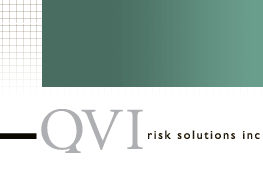|
Employers having 25 or more employees with
a history of stable claims experience may find self-funding
an attractive alternative to traditional insurance coverage.
The self-funded employer assumes the health expenses risk
in exchange for keeping and managing the health premium
dollars, which were normally allocated to the health insurance
carrier. Stop loss protects the employer from catastrophic losses.
Self-funded health plans
have several advantages over the traditional insurance system.
Self-funded plans can be tailor-made to provide specific
benefit levels that meet each employer’s individual
objectives.
QVI is a leader in providing
self-funded services. Our experienced staff takes pride
in providing outstanding service and a commitment to exceeding
the expectations of our clients.

QVI, as a third party administrator
(“TPA”), offers a high level of expertise in
providing administrative services to:
| • |
Traditional insurance carriers,
|
| • |
Other TPAs, |
| • |
Larger groups usually with 50 or
more employees that self-fund their employee benefit
programs, and groups of all sizes that self-fund dental and/or vision or provide other benefits such as FSA, HRA or MERP |
Examples of administrative
services include claims processing, customer
service and enrollment eligibility functions.
TPAs are responsive and provide close personalized service. Their flexibility and efficiency allows maximum opportunity for cost-containment and oversight. Customization and compliance support the needs of employers and employee groups.
QVI will assist the broker
and employer in every step of the implementation process
to assure a seamless transition. Click Brokers & Consultants
to see the wide range of services available when choosing
QVI as your TPA partner.
(return
to top)

In the traditional insurance market place the employer will
provide employee health coverage by purchasing a non-flexible
package of benefits at rates established by the insurance
company. Profits are not shared by the insurance company;
however losses most often result in a rate increase to the
employer at renewal. Self-funding offers the employer an
alternative to traditional insurance.
Instead of paying premiums
to the insurance company the employer deposits the funds
into a bank account specifically designated to pay the health
claims for the employees and their dependents. The employer
may also purchase stop-loss insurance to set a dollar limit
on specific health claims and an aggregate maximum providing
a known dollar liability for the entire group. The employer
typically selects a TPA to administer the plan.
(return
to top)

Self-funding offers the following advantages to the employer:
| • |
Flexibility to design plan benefits
to meet the specific needs of the employer. |
| • |
Money previously paid in premiums
to insurance companies can be used to increase company
cash flow. Interest on the funds stays with the employer. |
| • |
Lower administrative costs compared
to traditional insurance companies. |
| • |
Enhanced personalized service to
employees and employers. |
| • |
The option of excluding expensive
state-mandated benefits in their plan design as self-funded
plans are subject to Federal laws and regulation (ERISA,
HIPAA) and not state regulations. |
| • |
Flexible stop-loss options allow
the employer the choice of risk level for which they
feel comfortable. |
| • |
Claims experience includes only
the company’s employee base and not pooled with
other employers that may have poor claims results. If
during the plan year the company has good experience
the employer retains the funds not used. Should higher
than expected experience occur, stop-loss insurance
will protect and limit the losses. |
| • |
Increased choices in PPO networks
and Pharmacy Benefit Managers (PBMs). |
| • |
Statistical information is available
to the employer in both standard or client specific
formats. This assists with tracking the effectiveness
of the current plan and identifying modifications that
could achieve even greater cost savings in the future.
|
(return to top)

- Claims Adjudication, EDI, Claims Edits
- Plan Building, Plan Documents, Policies and Employee Benefit Booklets
- Identification Cards
- Stop-loss Insurance
- Pharmacy Benefits Management (PBM)
- PPO Networks
- Out of Network Claim Settlements
- Subrogation Cases
- Transplant and Cancer Care Centers of Excellence
- Utilization and Case Management
- Custom Reporting
(return to top)
|



